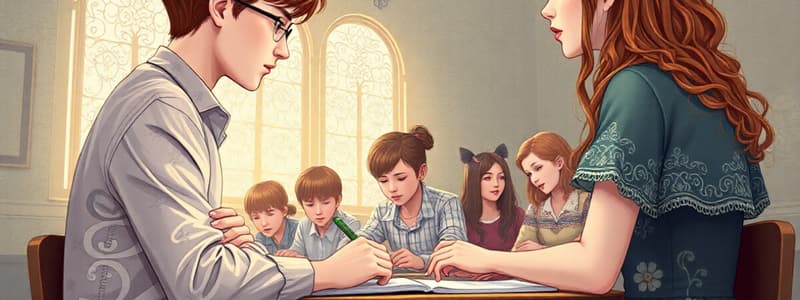Podcast
Questions and Answers
The narrator experienced bullying primarily due to her poor eyesight.
The narrator experienced bullying primarily due to her poor eyesight.
True (A)
The narrator felt encouraged to make friends despite being bullied.
The narrator felt encouraged to make friends despite being bullied.
False (B)
The narrator responded to the girl's rude comments with silence and indifference.
The narrator responded to the girl's rude comments with silence and indifference.
False (B)
The instance with the rude girl caused the narrator to release years of built-up anger.
The instance with the rude girl caused the narrator to release years of built-up anger.
The science teacher, Ms. G, related a story about a student named Sharuad who faced ridicule for his taste in music.
The science teacher, Ms. G, related a story about a student named Sharuad who faced ridicule for his taste in music.
The narrator's emotional response during the conflict with the girl was mild and controlled.
The narrator's emotional response during the conflict with the girl was mild and controlled.
The narrator believes the fight might help her become a better person.
The narrator believes the fight might help her become a better person.
The narrator received support and understanding from her classmates after the confrontation.
The narrator received support and understanding from her classmates after the confrontation.
What effect did the bullying have on the narrator's personality during her childhood?
What effect did the bullying have on the narrator's personality during her childhood?
How did the narrator react to the girl making rude comments during science class?
How did the narrator react to the girl making rude comments during science class?
What did the narrator perceive the rude girl as?
What did the narrator perceive the rude girl as?
What incident involving Ms. G does the narrator recall?
What incident involving Ms. G does the narrator recall?
What did the narrator do after losing her temper during the confrontation?
What did the narrator do after losing her temper during the confrontation?
What was the narrator's emotional state after the fight?
What was the narrator's emotional state after the fight?
What lesson does the narrator contemplate learning from her confrontation?
What lesson does the narrator contemplate learning from her confrontation?
What misconception did the narrator struggle with regarding her peers?
What misconception did the narrator struggle with regarding her peers?
How did the bullying affect the narrator's sense of self-worth?
How did the bullying affect the narrator's sense of self-worth?
What triggered the narrator's unexpected reaction during the classroom confrontation?
What triggered the narrator's unexpected reaction during the classroom confrontation?
In what way did the fight symbolize the narrator's past experiences?
In what way did the fight symbolize the narrator's past experiences?
What reflection does the narrator have about Ms. G's experience with Sharuad?
What reflection does the narrator have about Ms. G's experience with Sharuad?
What did the narrator’s confrontation with the rude girl reveal about her emotional state?
What did the narrator’s confrontation with the rude girl reveal about her emotional state?
How did the narrator initially cope with the teasing throughout her childhood?
How did the narrator initially cope with the teasing throughout her childhood?
What deeper emotions does the narrator express through her reaction in the science class?
What deeper emotions does the narrator express through her reaction in the science class?
What significance does the narrator attach to her physical response during the fight?
What significance does the narrator attach to her physical response during the fight?
What prompted the narrator to change his ways after the death of his friends?
What prompted the narrator to change his ways after the death of his friends?
How does the narrator feel about the change he has made in his life?
How does the narrator feel about the change he has made in his life?
What role does the narrator aspire to play for the younger members of his community?
What role does the narrator aspire to play for the younger members of his community?
Reflecting on his past, what does the narrator believe about the potential for change?
Reflecting on his past, what does the narrator believe about the potential for change?
What does the narrator imply about the fate of older cholos in the barrio?
What does the narrator imply about the fate of older cholos in the barrio?
What motivated the narrator to change his lifestyle after the deaths of his friends?
What motivated the narrator to change his lifestyle after the deaths of his friends?
How does the narrator perceive his role within the community after making changes in his life?
How does the narrator perceive his role within the community after making changes in his life?
What emotional state does the narrator experience when reflecting on his friends' deaths?
What emotional state does the narrator experience when reflecting on his friends' deaths?
What does the narrator believe is necessary for others to change their lives?
What does the narrator believe is necessary for others to change their lives?
What realization does the narrator come to regarding the older cholos in the barrio?
What realization does the narrator come to regarding the older cholos in the barrio?
Flashcards are hidden until you start studying
Study Notes
Childhood Bullying
- The author experienced persistent bullying throughout elementary and middle school due to their eyesight.
- Name-calling ("four eyes," "blind as a bat," "coke bottle") significantly impacted their self-esteem.
- The bullying caused the author to become shy, insecure, and withdrawn, hindering social interactions and preventing friendships.
Recent Bullying Incident
- A classmate made rude comments about the author's eyesight in science class.
- The author's response (initially ignoring, then confronting) escalated the situation.
- The classmate's retaliatory name-calling ("Shut up, blind") triggered a physical altercation (a slap).
- The author's emotional outburst stemmed from years of accumulated anger and frustration.
Teacher's Perspective and Reflection
- The science teacher intervened and separated the author and the classmate.
- The teacher shared a personal anecdote about another student, Sharud, who endured similar teasing due to physical appearance.
- The teacher's experience led to self-reflection and improved teaching methods.
- The author reflects on the possibility of personal growth and improved character as a result of the incident.
Childhood Bullying
- The author experienced persistent bullying throughout elementary and middle school due to their eyesight.
- Name-calling ("four eyes," "blind as a bat," "coke bottle") caused significant emotional distress.
- The bullying led to feelings of insecurity, shyness, and social isolation.
- The author avoided making friends to prevent further ridicule.
Confrontation in Science Class
- A classmate made rude comments about the author's eyesight.
- The author, unusually, confronted the classmate, expressing their frustration.
- The classmate responded with an offensive remark, triggering a strong emotional reaction.
- The author slapped the classmate, releasing years of pent-up anger.
- The author experienced a temporary loss of control and emotional distress after the physical altercation.
- The science teacher intervened to separate them.
Teacher's Reflection and Personal Growth
- The teacher shared a similar experience with a student named Sharuad, who was bullied for his big lips.
- The teacher's reaction to the incident (yelling at the class) was a result of feeling deeply affected by such cruel behavior.
- This incident provided the teacher with a lesson about improving her teaching approach.
- The author reflects on the possibility of personal growth and change as a result of the confrontation.
Childhood Bullying
- The author experienced persistent name-calling and harassment throughout elementary and middle school due to her eyesight.
- This led to significant emotional distress, including daily tears, social isolation, and a desire to change schools.
- The bullying shaped her personality, making her shy, insecure, and quiet. She avoided friendships to prevent further ridicule.
A Triggering Incident
- A classmate made rude comments about the author's eyesight in science class, writing on her jacket.
- This triggered a strong emotional response; the author, unusually assertive, confronted the classmate.
- The classmate's retaliatory name-calling ("Shut up, blind") resulted in the author physically reacting; she slapped the classmate.
- The physical altercation was described as a release of years of accumulated anger and frustration. The author experienced a temporary blackout from the intense emotion.
Teacher's Perspective and Reflection
- The author's science teacher intervened and separated the girls.
- The teacher shared a similar experience, recounting an incident involving a student named Sharaud, who was teased for his lips. A mean drawing of Sharaud's lips angered the teacher, leading her to reflect on her teaching methods.
- This anecdote and the author's experience may both provoke personal growth and improved understanding of tolerance.
Reflection on Loss and Change
- The author reflects on the deaths of two friends, highly respected members of their community.
- These friends' deaths occurred during a robbery attempt.
- The incident prompted a significant shift in the author's perspective and actions.
- The author acknowledges their past negative choices and their desire to become a positive influence.
- The author contrasts their past self with the current positive image held by younger community members.
- The author notes a significant change in their standing within the community.
- The author expresses regret over their past actions that harmed the community and a desire to make amends.
- The author's newfound role as a positive role model for younger people is highlighted.
- The author emphasizes personal responsibility for change and the impact of wanting to change.
- The author expresses sadness that their friends did not have the opportunity for a fresh start.
Reflection on Loss and Change
- The author reflects on the death of two friends, highly respected members of their community, who died during a robbery attempt.
- This event prompted a significant shift in the author's perspective and actions.
- The author acknowledges having previously followed a negative path.
- The author and their best friend are now the oldest "cholos" in the barrio, with many older individuals incarcerated.
- Over time, the author made a conscious effort to change their behavior, aiming to become a positive role model for younger community members.
- The author now strives to guide the youth, teaching right from wrong and presenting a positive example.
- The author's actions have led to increased respect and admiration from neighbors.
- Despite the positive transformation, the author expresses deep regret and sadness over the loss of their friends, highlighting the impact of their deaths as a catalyst for change.
- The author believes that change is possible at any stage of life, emphasizing the importance of personal desire and commitment to transformation.
- The author feels fortunate for the opportunity for a fresh start, expressing sorrow that their deceased friends did not receive the same chance.
Studying That Suits You
Use AI to generate personalized quizzes and flashcards to suit your learning preferences.




